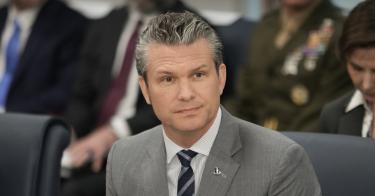The current structure of the Unified Command Plan (UCP)—the document that outlines the roles and responsibilities of America’s combatant commands, such as European Command (EUCOM), Special Operations Command (SOCOM), and Strategic Command (STRATCOM)—is outdated for today’s challenges.
The UCP, updated periodically, assigns combatant commands authority over various parts of the world and key missions, including nuclear deterrence, homeland defense, and logistics. Today, the UCP is overdue for a major update, as it no longer lends itself to a grand strategy aimed at deterring Chinese aggression.
Because the UCP’s existing focus on strict geographic boundaries, wherein EUCOM focuses on Russia and Indo-Pacific Command (INDOPACOM) focuses on China, existing planning and command of military forces is siloed by combatant command. This siloed command structure prevents the integrated, global planning required for the U.S. military in the event of a war with China.
In addition, the current structure is inefficient, with too many command headquarters and staffers. Each combatant command is led by four-star military officers and staffed by a host of generals, admirals, and civilian senior executives—to say nothing of the scores of mid-grade officers who support the generals. It is worth examining whether a merger of several regional commands could lead to more efficient planning and operations and better prepare the Department of Defense for the deteriorating global security environment.
>>> The New Cold War With China
The following changes to the UCP would fix these deficiencies:
1) Make the Joint Staff the supported (i.e., lead) command for global operations during a war with China. Currently, the UCP identifies INDOPACOM as the lead command for planning a conflict with China. The Department of Defense should consider updating the UCP so that INDOPACOM remains the lead command in the Western Pacific while the Joint Staff coordinates the planning and execution of global operations against Chinese targets outside the Pacific theater.
In many ways, having the Joint Staff oversee a global war would echo the command relationships of both World War II and the Cold War. In World War II, the Joint Chiefs of Staff and the larger U.S.-UK Combined Chiefs of Staff oversaw global operations against the Axis and coordinated military actions in the Pacific, North Africa, Europe, and South Asia. In the Cold War, the Joint Staff issued the Joint Strategic Capabilities Plan, which “outlined the distribution, use, and support for existing forces should war erupt” with the Soviet Union.
It was only in the mid-1980s, in the twilight hours of the Cold War, that the Defense Department recognized that war with the Soviet Union was less likely than a regional conflict erupting in a region overseen by a unified command and the current era of bureaucratically powerful combatant commands arose.
With the potential return of a global war, it is time to reconsider the Joint Staff’s historical role of coordinating the planning and execution of global operations during a conflict. The focus of specific Combatant Command contingency operations during a conflict with China would be to prevent disruption to U.S. and allied force projection and sustainment, as well as the potential disruption of critical resources that China requires to initiate, escalate, or sustain aggression.
2) Direct all geographic combatant commands to plan for a China contingency. Geographic combatant commands would be required to submit plans for action against China to the Joint Staff within their respective regions.
Any conflict with China would have global implications—and may well unfold across the globe, with combat operations potentially taking place in Africa, Latin America, and the Middle East. INDOPACOM’s ability to plan, coordinate, and oversee such operations while focused on the central front of a war with China in the western Pacific would likely be limited.
Conducting operations outside of INDOPACOM would be especially relevant in a protracted conflict in which Chinese reliance on energy imports became a major vulnerability. The relevance of global planning outside INDOPACOM will also continue to grow in importance as China expands its global military footprints and looks to build bases abroad.
>>> Secret Chinese Links Behind Anti-Israel Groups That Fostered Elias Rodriguez’s Hate
3) Include the Golden Dome missile defense mission in the UCP. The UCP should designate the U.S. Space Command as the agent for fielding and operating the Golden Dome system, as well as the supported command for global missile defense operations. It would be supported by the existing Missile Defense Agency—a three-star Combat Support Agency—which would focus on research and development for the overarching systems. This would align with President Trump’s May 20 announcement that General Michael Guetlein of Space Force will be the Golden Dome executive agent.
4) Merge Africa Command with European Command. Africa, compared with the North American homeland, the Indo-Pacific, Europe, the Middle East, and Latin America, presents distinct and specific challenges when it comes to American interests. That said, those interests do not justify having a full combatant command led by a four-star general and the commensurate staff elements. Instead, the European Command should absorb Africa Command and form a new “Atlantic Command” that incorporates the borders of the two former commands.
In either case, European security and deterring Russian aggression should remain the priority duty. Under the new arrangement, a Joint Interagency Task Force-Africa should be established to address relevant terrorism challenges or threats posed by Russia or China that may arise in Africa.
5) Shift Greenland from European Command to Northern Command. Given the importance of Greenland to North American defense—particularly defense against missile attacks generated in Eurasia—it makes particular sense to move Greenland fully into the Northern Command area of operation.
The author does not make these recommendations lightly—but the UCP must keep pace with the challenges that threaten American interests and the American people. The president and the secretary of defense have the power to issue new UCPs at their will. They should exercise that power now.
This piece originally appeared in The National Interest





